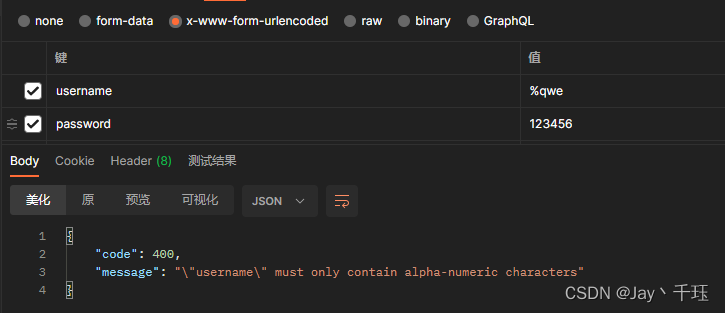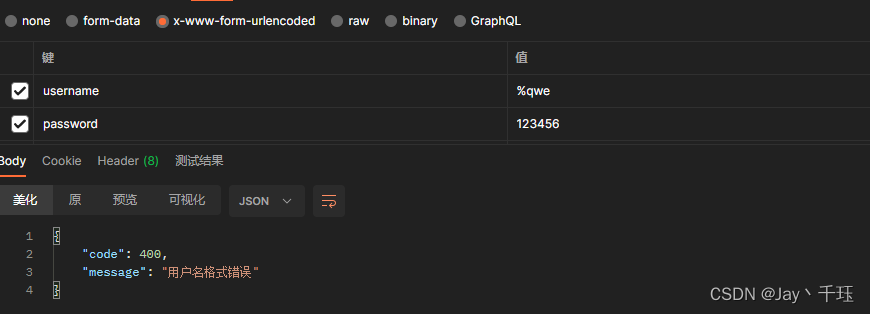目录
前言
在项目中,提交表单进行字段验证是必不可少的,在node项目中,自己写if else判断非常的繁琐,也不好进行维护,所以我们通常都会引入第三方包joi,来帮助我们进行表单字段的验证。
原始版
于是我写下了以下代码:
const username = joi.string().alphanum().min(1).max(10).required()当然,验证是通过的,没有问题的,
username是一个字符串,值只能包含 a-zA-Z0-9,最小长度1,最大长度10,必填项。
利用postman发送请求,先看看会返回什么。
长度大于10的时候返回:

包含特殊字符的时候返回:

等等,还有很多,但都是返回的英文,虽然能读懂是什么含义,但是对于用户来讲,用户看不懂,于是要求返回中文
基础错误版
于是我又写了以下代码:
const username = joi.string().alphanum().min(1).max(10).required().error(new Error('用户名格式错误'))postman请求一哈

然后吧,就发现任何错误的格式,返回的错误都是用户名格式错误,包括username为空,username参数不存在,username长度超出10等等 ,用户压根不知道自己犯了什么错。。。这种错误提示信息看来还是不行
复杂版
于是我又又写下了如下代码
const username = joi.string().alphanum().min(1).max(10).required().error(
errors => {
console.log(errors)
for (err of errors) {
console.log(err.code)
switch (err.code) {
case 'string.alphanum':
return new Error('只能包含a-zA-Z0-9')
case 'string.max':
return new Error('用户名长度不能超过10')
case 'string.empty':
case 'any.required':
return new Error('用户名必填')
default:
return new Error('用户名格式错误')
}
}
}
)errors:
[
{
code: 'string.alphanum',
flags: { presence: 'required', error: [Function (anonymous)] },
messages: {
'any.custom': [Object],
'any.default': [Object],
'any.failover': [Object],
'any.invalid': [Object],
'any.only': [Object],
'any.ref': [Object],
'any.required': [Object],
'any.unknown': [Object],
'string.alphanum': [Object],
'string.base': [Object],
'string.base64': [Object],
'string.creditCard': [Object],
'string.dataUri': [Object],
'string.domain': [Object],
'string.email': [Object],
'string.empty': [Object],
'string.guid': [Object],
'string.hex': [Object],
'string.hexAlign': [Object],
'string.hostname': [Object],
'string.ip': [Object],
'string.ipVersion': [Object],
'string.isoDate': [Object],
'string.isoDuration': [Object],
'string.length': [Object],
'string.lowercase': [Object],
'string.max': [Object],
'string.min': [Object],
'string.normalize': [Object],
'string.token': [Object],
'string.pattern.base': [Object],
'string.pattern.name': [Object],
'string.pattern.invert.base': [Object],
'string.pattern.invert.name': [Object],
'string.trim': [Object],
'string.uri': [Object],
'string.uriCustomScheme': [Object],
'string.uriRelativeOnly': [Object],
'string.uppercase': [Object]
},
path: [ 'username' ],
prefs: {
abortEarly: true,
allowUnknown: true,
artifacts: false,
cache: true,
context: null,
convert: true,
dateFormat: 'iso',
errors: [Object],
externals: true,
messages: {},
nonEnumerables: false,
noDefaults: false,
presence: 'optional',
skipFunctions: false,
stripUnknown: true,
warnings: false
},
state: {
path: [Array],
ancestors: [Array],
mainstay: [Object],
schemas: null,
debug: null
},
value: '%qwe',
message: null,
template: null,
local: { label: 'username', value: '%qwe', key: 'username' }
}
]随后再用postman进行测试的时候,感觉这提示也太人性化了吧 0.0



简单版
后来经过查阅资料得知,还可以简单点
于是我又又又写下了如下代码:
const username = joi.string().alphanum().min(1).max(10).required().messages({
"string.empty": "用户名必填",
"any.required": "用户名必填",
"string.alphanum": '只能包含a-zA-Z0-9',
"string.max": '用户名长度不能超过10',
})经过测试,和error的模式是一样的,还挺不错!